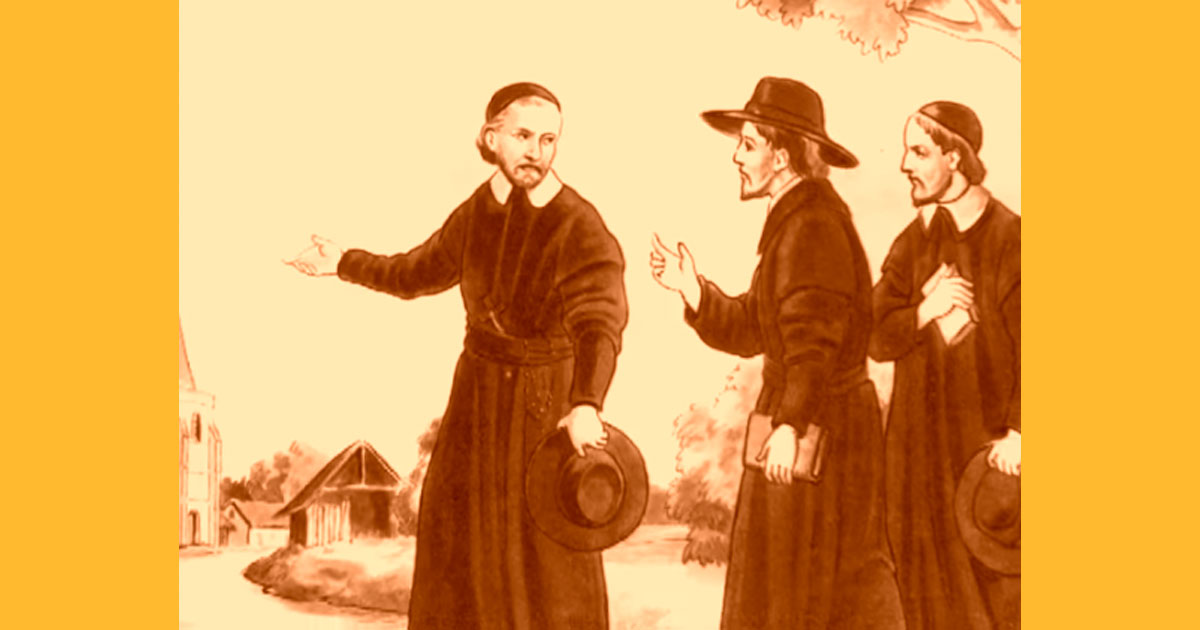Journey of Vincent
Vincent de Paul was born in France in 1581 during a time not unlike today: a time marred by war, disease, and poverty. Follow his life’s journey in this classic video narrated by Fr. John Freund, C.M.
Transcript:
Journey of Vincent
St. Vincent de Paul: Peasant, Ambitious Social Climber, Priest, Teacher, Spiritual Leader, Organizer, Saint
Vincent was born in France in 1581 during a time not unlike today: a time marred by war, disease, and poverty. As a young peasant boy, Vincent learned the meaning of hard work by tending the family livestock as their primary means of support. His parents recognized that he was clever and creative, and sacrificed to send him to school.
Vincent was also ambitious. He wanted out of the peasant life, and decided that the priesthood was the best way to acquire a career, family security, and a respectable position in society. At age 19, he was ordained a priest and headed to Rome to complete his education. Throughout his 20s, Vincent’s attitude was, “What’s in it for me?” So he often sought out wealthy benefactors. However, in his 30s, a profound spiritual change was beginning. He had battled depression, and wrestled with doubt. In working to help others, Vincent discovered the meaning of his own life. He experienced conversion to a life of surrender to the will of God, and consistent service to the poor.
In his first parish, he showed his talents in organizing service to the marginalized. From there, he improved the horrendous conditions of galley slaves; he recognized the abysmal state of the priesthood, and attracted other dedicated priests to reform the clergy, as well as to bring the Word of God and sacraments to the poor. Today, these priests and brothers are known as the Congregation of the Mission: Vincentians.
In the 1620s, Vincent met a holy collaborator, a woman who would become a Saint in her own right: Louise de Marillac. Louise and Vincent together co-founded the Daughters of Charity, a group of more than 25,000 members worldwide today.
In the early 1600s, Vincent established the first charitable organization comprised of affluent and generous lay people, working to care for the poor. This group was the forerunners of the Ladies of Charity, the oldest organization of lay women in the Church. It is currently an organization of 250,000 women volunteering in virtually all countries.
For over three decades, Vincent worked tirelessly to raise awareness of the needs of those who were poor. He held weekly instruction conferences for the clergy, organized retreats, established seminaries and missions, and structured war relief efforts. He was instrumental in establishing orphanages, hospitals, emergency services to refugees, nursing of wounded soldiers, and care of plague victims and the elderly.
At the heart of his accomplishments was his deep conviction of the fundamental dignity of every human person, made in the image and likeness of God, and his conviction that all persons benefit in the mutuality of service. Vincent’s life and teaching affirm that no one is so rich that he cannot receive, and no one is so poor that he cannot give.
Vincent’s life work served to bring Good News to the poor, and give voice to the voiceless. He not only changed the face of France, but also inspired millions to carry on his mission globally. In fact, today, nearly two million followers of Vincent, not only the groups he directly founded, such as the Congregation of the Mission, the Daughters of Charity, the Ladies of Charity which is the oldest functioning group of lay women with its 250,000 members today, but also, the more than half million members of the Society of St. Vincent de Paul, the various groups of Sisters of Charity… in short: priests, Brothers, Sisters, members of lay movements… they are all animated by the same desire to help the poor and the marginalized.
St. Vincent’s life was a perfect example of how deep compassion can change our lives and communities. Getting to know Vincent enables us to discover what inspired and possessed him, and what touches our own hearts, and calls us today to actions of love and justice to transform our world. And that’s what it means to be “Vincentian” today.







Very usable tool for a brief introduction to Vincent. Thanks.